After a couple months working on it, I’ve been thinking about the experience of writing a serious non-fiction book. It’s been a stretch for me, in quite a good way so far: I’m writing about something big that I’m passionate about, but in a manner that I find new and very challenging.

my backyard office with dog, via flickr
First, writing without footnotes is a pretty liberating experience. I’m the sort of scholarly writer who likes the recapitulate his entire intellectual history in the first five footnotes, and construct a dense thicket of citations to support my main text. If anybody doesn’t know, this is part of an academic game that has several goals: creating a defensive barrier below your work that keeps it from being undermined (“well, yes, you would think that’s a flaw in my argument if you haven’t read these sixteen other things”), creating a place for your work in the literature, and sending little mash notes to people whose work you like. The downside is that this is an enormously time-consuming game, and it’s a great way to procrastinate; if you get too caught up in it, it gets harder to actually write.
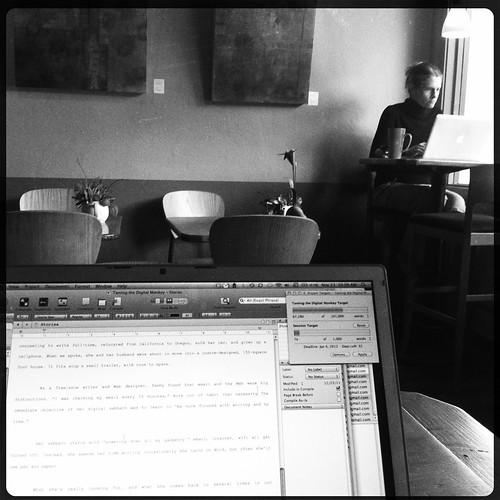
working at cafe zoë, via flickr
Little Brown doesn’t do footnotes; instead, their books have bibliographic essays at the end. This means that I don’t have to document every claim I make as I write it; I need to keep track of what I’m doing and where things come from, of course, but there’s a whole slice of literary labor that I can forget about. The standard in the industry is also to quote other people sparingly, unless they’re Shakespeare or Yogi Berra; as my editor explained, they’re buying MY ideas, not my gloss on someone else’s.
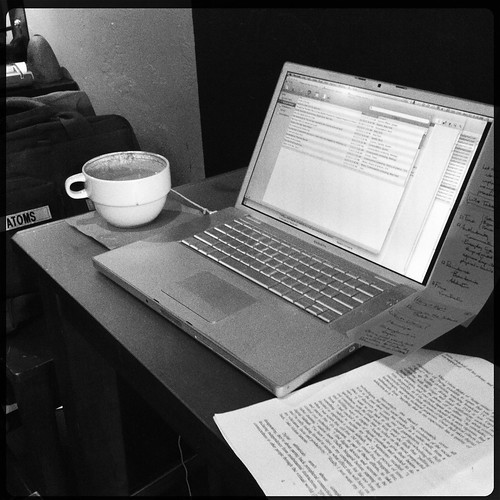
working at cafe zoë, via flickr
The result of all this has been that I’m writing faster; it also means that I’m constructing a different kind of relationship between this work and my sources, and between my authorial self and other writers in the field.
Put most simply, knowing that I can’t impress readers with spectacular acts of citation jujitsu means that I have to make the work itself more compelling, and my own voice more authoritative. A footnote citing half a dozen books can be the intellectual version of an incomplete sentence, an erudite way of saying, “Well, you know…” With this, I have to actually FINISH the thoughts, and make them mine.
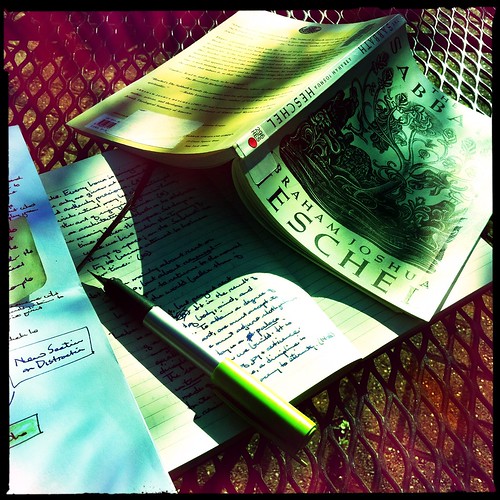
reading abraham heschel’s The Sabbath, via flickr
The practice of quoting other works has one big benefit: it means I’m doing more interviews with people. Even when I can pull a quote from something a person has written, it’s better to quote from an interview. This is, in effect, a great excuse to talk to have conversations with interesting people, which is something I always enjoy. And fortunately they’re quite forgiving when we go over things they’ve already written about; few people actively dislike talking about their work, and most of them know how this game work.

via flickr
What I find really unexpected is that this kind of authority– writing that depends more on what the AUTHOR does, than on who the author cites– is, for me at least, truer to the ideal of scholarly authority. It forces you to take complete responsibility for your ideas. (Even at the Institute, while we didn’t use footnotes, we often supported ideas that were challenged by readers (usually clients or prospective clients) by saying, in effect, we’re just telling you what our expert sources told us.) You can argue that some writers abuse this, by appropriating other people’s ideas, or not sufficiently acknowledging their debts; I hope to avoid that, but I can now see how it happens.

getting pretty deep, via flickr
I’ve also been struck at how much writing is a business, albeit one that requires a high degree of focus and creativity. Even after editing the Encyclopaedia Britannica, publishing an academic monograph, turning out articles in newspapers, Scientific American, and lots of academic journals, I’m learning a LOT about how the trade book market works, and it’s pretty different from everything else.
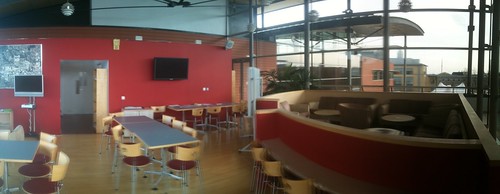
microsoft research cambridge, via flickr
With my ambitious 1,000 word/day writing schedule, I’m also having to be very ruthless about my time and avoiding distractions. I’m not always successful (WILL JACK EVER ESCAPE FROM THE OTHERS? WHAT THE HELL IS THAT SMOKE MONSTER?), but this kind of writing requires starting early (the days when I’m up before 6, and get some writing done before I have to take the kids to school, are the most satisfying), and not giving up. People who think you get inspired, then rush to the keyboard and write in a creative frenzy, have it exactly backwards: you sit at the keyboard, and hope you can get to that state.
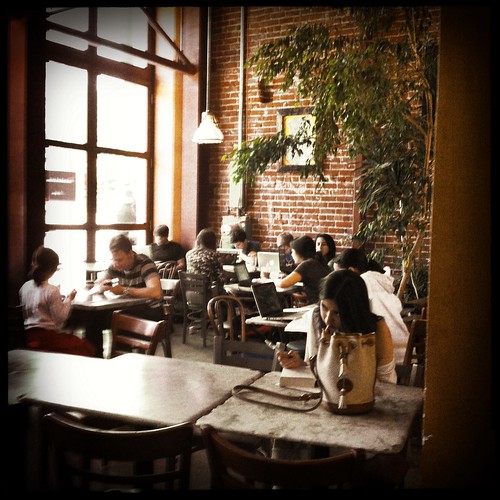
cafe milano, berkeley, via flickr
At the same time, while you need to hit your deadlines, you also need to be creative: anyone can tell the difference between what I’ve written when I’m really engaged and passionate, and what I write when I’m turning out Product. People don’t tell their friends that they have to read this Product; Terry Gross doesn’t interviews to writers about Product. They want strong, passionate writing, and creating it is… a challenge.

stimulant, distraction, caffeine, via flickr
Paradoxically, I think setting a 1,000 word/day pace for myself turns out to be a good way to bring on that more creative state, that feeling of being entangled with the work. The more you’re able to write to a schedule, the more likely you are to hit those great moments when you feel like you’re transcribing ideas that come from somewhere other than your own mind. It can take at least a day to get to that mental state where the ideas really flow well; inspiration doesn’t come in a flash, but after a long run-up. Put another way, those states can, to some degree, be induced: you can start wordsmithing and end up doing something really creative. This helps explain Frans Johannsen’s observation (in The Medici Effect) that creative people do some of their best, most memorable work when they’re doing a LOT of work. We assume that masterpieces are the result of long solitary focus on a single problem, but they’re more usually part of a bigger enterprise.
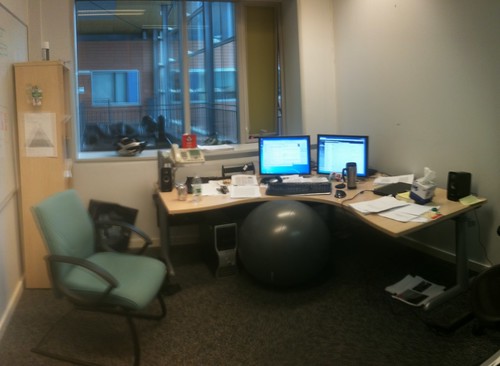
my office in microsoft research cambridge, via flickr
Now back to real writing.

working at cafe zoë, via flickr